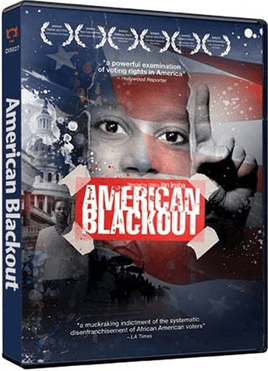American Blackout facts for kids
Quick facts for kids American Blackout |
|
|---|---|
 |
|
| Directed by | Ian Inaba |
| Produced by | Jean-Philippe Boucicaut Anastasia King Stephen Marshall |
| Starring | Cynthia McKinney |
| Music by | Michael Bearden |
| Editing by | Jean-Philippe Boucicaut Liz Canning Ian Inaba |
| Distributed by | Guerrilla News Network |
| Release date(s) | September 22, 2006 |
| Running time | 92 minutes |
| Country | United States |
| Language | English |
American Blackout (2006) is a documentary film that explores important events around voting in the United States. It was directed by Ian Inaba. The film first showed at the 2006 Sundance Film Festival. It looks closely at the political journey of Congresswoman Cynthia McKinney. It also talks about concerns regarding voting rights and the use of voting machines in the 2000 and 2004 presidential elections.
Contents
Understanding Voting Rights in America
This section helps explain the main ideas in the film. American Blackout looks at how people vote and if everyone's vote counts.
What is a Documentary Film?
A documentary film is a movie that tells a true story. It uses real events, people, and facts. Documentaries often try to teach viewers about a topic. They can also share different points of view.
The Importance of Voting Rights
Voting is a basic right in a democracy. It allows citizens to choose their leaders. The film discusses voter disenfranchisement. This means making it harder for some people to vote. This can happen in many ways. It might involve unfair rules or problems with voting equipment.
How Voting Machines Work
The film also talks about voting machines. These are devices used to cast and count votes. There are different types of machines. Some use paper ballots, while others are fully electronic. The film raises questions about how secure and accurate these machines are.
Focus on Cynthia McKinney's Story
A big part of American Blackout follows the career of Cynthia McKinney. She was a U.S. Representative from Georgia. The film looks at her election campaigns.
McKinney's 2002 Election Challenge
In 2002, Cynthia McKinney lost a primary election. A primary election helps a political party choose its candidate. She lost to Denise Majette. Both women are African-American. The film suggests that McKinney's loss was part of an effort to limit minority votes.
McKinney believed that voters from another party helped her opponent win. In Georgia, primary elections are "open." This means anyone can vote in them, no matter their party. McKinney tried to challenge this rule in court. She argued it went against the 14th Amendment. This amendment ensures equal protection under the law. However, the court did not agree with her case.
Her Return to Congress in 2004
Despite her loss in 2002, Cynthia McKinney ran again in 2004. She was successfully re-elected to the U.S. House of Representatives. The film covers her journey back to Congress. It highlights the challenges she faced.
Other Voices in the Film
American Blackout also features other important figures. They share their thoughts on voting rights and politics.
John Lewis and Civil Rights
The documentary includes John Lewis. He was a famous civil rights leader. He also served as a U.S. Representative. Lewis shares a powerful story in the film. He recounts the historic march from Selma to Montgomery, Alabama. This march was a key event in the fight for voting rights. It took place across the Edmund Pettus Bridge.
Bernie Sanders on Voter Turnout
Future Presidential Candidate Bernie Sanders also appears in the film. He talks about how money can influence elections. Sanders suggests that some powerful groups want fewer people to vote. This can make it easier for them to control election outcomes.
Film Recognition
American Blackout received special recognition. It won the Special Jury Prize (Documentary Jury) at the 2006 Sundance Film Festival. This award shows that the film was highly regarded by the festival's judges.

